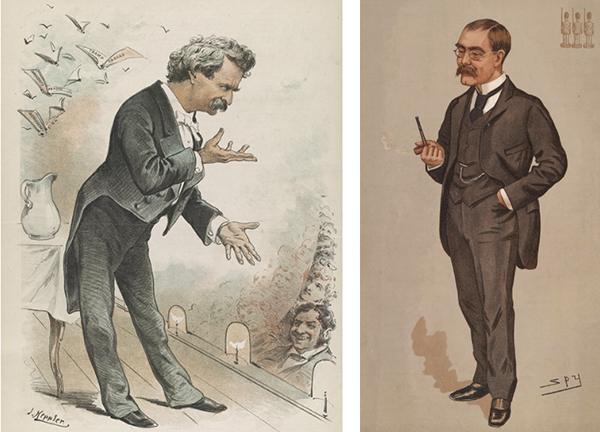Masonry and the Importance of Words
This article originally appeared in the March/April 2024 Scottish Rite Journal.
William C. Jacobson, Ph.D., 33°, GC
I am, by calling, a dealer in words; and words are, of course, the most powerful drug used by mankind.
Not only do words infect, ergotise, narcotise, and paralyse, but they enter into and colour the minutest cells of the brain ...
—Br. Rudyard Kipling, Address at Annual Dinner, Royal College of Surgeons, February 1923
Living life means each of us must select our words and learn by using them. Used well, they can become, as Br. Kipling, esteemed writer, notes, powerful medicine to the body, mind, and souls of all involved.
Masonic lessons are learned with words. Daily we select words that communicate to others. We connect when our words are understood. They are effective when they change what others think and do.
Some words work well, whereas others do not. Words not understood do not communicate. Simple, common old words work best. The reactions of others reveal the impact of your words.
After the Battle of Gettysburg, Abraham Lincoln wrote a stinging letter to General Meade when Meade let the Confederate army return to the South after the battle was over. As President of the United States, he was trying to win a war. Lincoln was angry. He never sent it. It was found in his desk after he was assassinated. Masonry teaches us to let cooling thoughts control our words. We never have to apologize for the words we do not use.
Word selection is an acquired skill. The challenge for each person is to find words that can be medicine to others. Human feelings help select these words and identify the best time to use them.
Some occasions do not require words. As Masons well know, silence is often the most powerful communicator. Your presence is your message.
Selecting the right words is an art more than a science. Words can cause change. Observing what others do reveals the effectiveness of words.
Words define personal character. They can be used in many ways to connect with others. Humor can set a mood that delivers a message. When using humor, it works best when you are the butt of the joke. Belittling others sends messages that will be returned.
Masonry uses words to teach lessons. Many words need to be repeated to be understood. Repetition seals words in our memory. Representing Hiram well as we live life requires effective words. They help us move along the path to becoming a Master Mason.
In his Lecture to the Thirteenth Degree, “Royal Arch of Solomon,” Albert Pike writes of “the Lost Word, which was made known to the Grand Elect, Perfect, and Sublime Masons.” In fact, each Mason searches for the Lost Word. It is a personal quest that is different for each person. It requires an interpretation of Masonic symbolism. I have discovered that word for me. It is change. We change each day by learning, unlearning, and relearning what we need to know to master ourselves.
A teacher once shared these words from an essay a senior girl had written to explain how she planned to live her life. She wrote words to this effect:
Husbands are expendable necessities. I plan to get married four times. My first husband will be a banker. My second husband will be a movie director. My next husband will be a beautician. My last husband will be a mortician.
Each husband will meet the evolving needs of my life.
These needs she summarized in these words. One for the money, two for the show, three to get ready, and four to go.
The Gospel of John opens with these words. “In the beginning was the word, and the word was with God, and the word was God.” We begin our Masonic journey by putting our trust in God. It is a lifelong commitment. When we trust God to direct our words, He will. Even our casual words are remembered and can impact what happens next.
Words matter. Remember:
You will be what you think you are.
Let failure find its false content.
Life is lived with and through others.
Words reveal your intent.
The human soul, a force unseen,
Directs behind the scenes.
Words can find the way to any goal
Though walls of granite intervene.
Be patient choosing your words.
Select them seeking to understand.
When the unseen spirit directs,
The right words are at your command.
As Br. Mark Twain explained in his novel A Connecticut Yankee in King Arthur’s Court, “Words realize nothing, vivify nothing to you, unless you have suffered in your own person the thing which the words try to describe.”
Freemasonry teaches us to select our words carefully and to imprint these words upon our lives. I have found three words that work well in most situations. They are: God Bless You!
For a biography of Ill. Jacobson, the author of this article, please see the Grand Cross biography in the Current Interest section of the March/April 2024.
Image: Two Famous Brother Wordsmiths—Mark Twain and Rudyard Kipling. (Left) Lithograph of Br. Mark Twain, Puck, December 16, 1885. Br. Twain’s words “take flight” in the forms of his books A Tramp Abroad, Innocents Abroad, and Huckleberry Finn. (Right) Lithograph of Br. Rudyard Kipling, Vanity Fair, July 7, 1894. The three soldiers at upper right allude to Br. Kipling’s collection of stories Soldiers Three. Source: Wikimedia Commons







